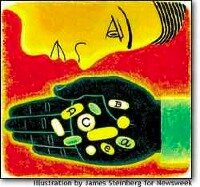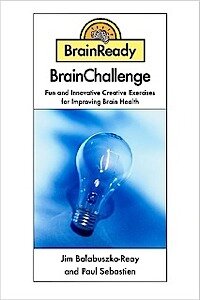
(Before reading the following article, we'd like to introduce Dr. Carl Hansen, Jr., M.D., and his wonderful example: a doctor with a deep passion for and knowledge of brain health, how vitamins and nutrients play a truly vital role in keeping one's brain healthy and even reversing decline, and frustration about the fact that most other supplement products on the market used either cheap versions of key nutrients in forms that our bodies can't make use of, or uninformed combinations and dosages of vitamins that negated their possible benefits, or worse -- dangerous amounts of the wrong kinds of vitamins, supplements that don't undergo rigorous testing for metals and other pollutants, and more.
All of these things inspired Dr. Hansen to create his own line of ultra-premium brain health supplements, using only the bioavailable versions of the key nutrients, ensuring rigorous quality and testing standards, and all combinations and dosages informed by extensive research. We came across Dr. Hansen and his MEND Solutions vitamins by accident, and after learning the backstory (and trying the supplements ourselves), we're honored to help spread the word about MEND despite our usually neutral stance on endorsing specific products -- as examples like this in the supplements industry are rare and should be rewarded.
We're adding links to Dr. Hansen's brain supplements in the BrainReady Favorites Store area, so check them out if interested (and as always, be sure to check with your doctor or health care provider before taking any supplements, just to be safe).
On with Dr. Hansen -- whom we'd like to thank again for his excellent article below, and also for caring enough about his patients and the public at large to create brain health supplements that go above and beyond the standards of many others...)
- The BrainReady Team
B Vitamins, Bioavailability, and Your Brain
by BrainReady special guest contributor Dr. Carl Hansen Jr., M.D.
Our scientific understanding of brain health has improved greatly over the past 50 years. The growing base of knowledge has provided scientists and doctors with important information about the critical role different vitamins, minerals and nutrients play in this complex and fascinating organ.
High-quality, bioavailable supplements can be a powerful tool for improving and maintaining brain health.
Unfortunately, for the average consumer interested in purchasing a supplement, the options can seem daunting. Combine this array of options with the fact that many of the products on the shelves may be of questionable quality and effectiveness; it is easy to see why many people grow increasingly frustrated and confused.
If a person wants to garner the health benefits associated with any vitamin, it is essential that they take a supplement that contains vitamins in their “bioavailable” forms: bioavailability guarantees that the vitamins come in a form that the body can readily absorb, metabolize and use. Many products may claim to contain certain vitamins, but do not offer them in their most bioavailable form.
Take Vitamin B-12 as an example. The most common form of Vitamin B-12 found in the bloodstream is methylcobalamin. It is the only form of Vitamin B-12 that the brain uses to metabolize the amino acid, homocysteine. Elevated homocysteine appears to increase the risk of developing dementia and depression.
Published research going back to the 1990’s has also established methylcobalamin’s ability to help reverse nerve damage, promote nerve cell regeneration and aid neurotransmitter function in the brain.
Most products contain cyanocobalamin, which is a cheap, less bioavailable form of Vitamin B-12. When a person takes cyanocobalamin it must first be absorbed and then processed by the liver. The liver must convert cyanocobalamin into bioavailable methylcobalamin because it is the only form of Vitamin B-12 that the brain absorbs. The body’s ability to convert cyanocobalamin into methylcobalamin can be compromised by a variety of factors. These include liver and gastrointestinal problems, genetic conditions, drinking, smoking, old age and taking certain medications.
To ensure that you receive the utmost benefit from the B-12 supplement you take, it is advisable to select a product with methylcobalamin, not cyanocobalamin.
Another important bioavailable B-vitamin is calcium folinate, a stable, easily absorbed and bioactive form of folate.
Most people only think of folic acid when it comes to the folate family of vitamins. Folic acid, contained in nearly all supplements, must be converted into biologically active folates. Only these biologically active forms of folate are used in the body’s chemical pathways. This conversion is also necessary for various folates found in food.
In 2007 a series of articles appeared in the Journal of Clinical Psychiatry that recognized the potential importance of folate in combating depression and dementia.
One article, that examined a connection between folate deficiency and depression, concluded that it “may lead to poor treatment outcomes in patients by reducing treatment responses (to antidepressants), slowing clinical improvement, and increasing relapse.” Some scientists believe this is tied to the role folate plays in the chemical reactions that produce serotonin, dopamine and norepinephrine in the brain. It has long been known that these three chemicals are linked to clinical depression.
Evidence from another study indicated that as many as one-third of all depressed patients have low levels of Vitamin B-12 or folate.
Vitamin B-6 is a vitamin that has been shown to improve brain function as well. The most common form of Vitamin B-6 found in supplements and fortified food is synthetic pyridoxine. Many people face problems from its excessive bioavailability.
In Harrison’s Principles of Internal Medicine, Jean Wilson, M.D. reported that about 40% of American women consumed excessive amounts of pyridoxine in multivitamins and other supplements. Excessive pyridoxine intake has been associated with nerve and liver damage. Back in 1983, Schaumberg and associates described sensory nerve damage due to taking excessive amounts of pyridoxine in the New England Journal of Medicine.
Anyone who wants the benefit of supplemental B-6 without the hazards of pyridoxine should choose a product with Vitamin B-6 in the form of pyridoxal-5-phosphate.
A few years ago I scoured the market for high-grade bioavailable supplements, while keeping in mind this growing body of brain health research.
Few products were designed with the latest scientific research in mind, and almost all lacked the proper combinations of bioavailable ingredients, like methylcobalamin.
Multivitamins are very popular and have been aggressively promoted for many years. One pitfall of relying on multivitamins for supplementation, however, is that their combined ingredients chemically react.
Minerals, Vitamin C and Vitamin B-12, for example, are often found in the same multivitamin product. These other ingredients can render up to 30% of a multivitamin’s Vitamin B-12 inactive.
In fact, the incompatibility of Vitamin C and Vitamin B-12 was first reported by Trenner and associates in 1950 in an article in the Journal of the American Pharmacists Association. Then in 1982, Kondo and associates reported in the Journal of Clinical Investigation that multivitamins can produce Vitamin B-12 analogues that can actually shut down chemical reactions in the body that require Vitamin B-12.
The cavalier attitude many companies continue to hold regarding product safety and purity is also alarming. Dietary supplements fall outside the scope of FDA jurisdiction, and as a result, the onus falls upon companies to independently ensure their products are safe. Unfortunately, most companies do not go that extra mile.
Frustrated, I decided to design the type of premium bioavailable supplements geared toward brain health that no one else was producing. The end result was MEND Solutions™ Health Formulas and products like Premium Brain Support™ which contain bioavailable methylcobalamin and calcium folinate.
A stringent protocol to monitor quality and safety was also implemented to ensure that the supplements possessed a degree of purity that surpassed the “pharmaceutical grade” safety standards applied to prescription drugs. Even “pharmaceutical grade” standards make allowances for small amounts of contaminants and toxins.
But by using available technology, it is possible to guarantee that a supplement is almost 100% pure and contaminant-free. This approach provides access to high-quality, bioavailable supplements for everyone striving to sustain good health, which depends first and foremost, on having a healthy brain.
(Another thanks to Dr. Hansen and his team for writing informative article and providing BrainReady readers with this little-known information regarding B vitamins, bioavailability, and combining vitamins! What do you think about all of this? Discuss below by clicking the 'Comments' link and share your thoughts...)




